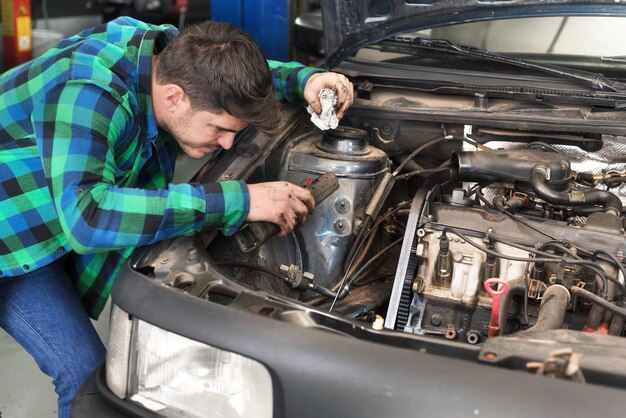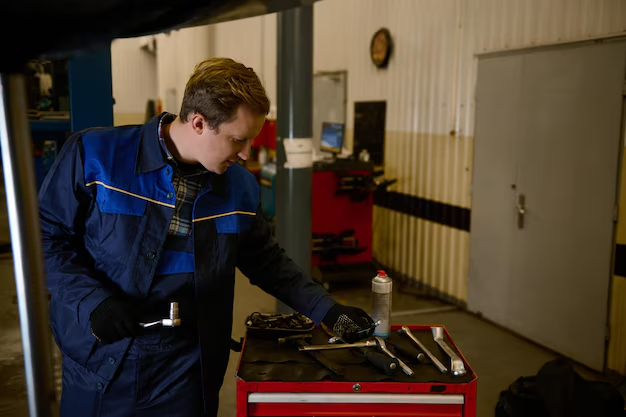
The Ultimate Guide to German Car Cooling System Maintenance
When it comes to German engineering, performance and precision are more than just buzzwords—they’re a way of life. Whether you’re behind the wheel of a finely tuned BMW, a luxurious Mercedes-Benz, a powerful Audi, or a spirited Volkswagen, your car is a testament to expert craftsmanship. But even the most advanced German vehicles rely on something very basic to keep things running smoothly: a properly functioning cooling system.
Neglecting cooling system maintenance can lead to engine overheating, poor performance, and costly repairs. So if you’re serious about preserving your vehicle’s longevity, understanding your cooling system—and keeping it in top shape—is essential.
Let’s break down everything you need to know about cooling system care and why it’s especially critical for German cars.

Why the Cooling System Matters in German Cars
Every internal combustion engine generates heat. A lot of heat. Without a cooling system, your engine would overheat and seize up in minutes. The job of your cooling system is to regulate temperature, absorb excess heat, and keep everything operating within the optimal range.
German vehicles are built for performance, with tight tolerances and finely calibrated components. That means their cooling systems must work with even greater precision. A BMW coolant flush isn’t just a nice-to-have—it’s a must-have maintenance task if you want to avoid problems down the line.
When the cooling system is compromised, the risks multiply:
- Overheating can warp cylinder heads and damage head gaskets.
- Coolant leaks can lead to engine misfires or sensor failures.
- Dirty or degraded coolant can corrode internal components.
In other words, if you love your German car, your cooling system needs to be one of your top priorities.
Key Components of a Cooling System (And What Can Go Wrong)
Understanding what makes up your cooling system can help you spot issues early. The main components include:
- Radiator: The heart of the cooling system, where heat is dissipated.
- Coolant/Antifreeze: Circulates through the engine and radiator to absorb and release heat.
- Thermostat: Regulates coolant flow depending on engine temperature.
- Water Pump: Circulates coolant through the engine and radiator.
- Radiator Hoses & Reservoir: Channels for the coolant to flow and expand under pressure.
- Cooling Fans: Helps pull air through the radiator when the car is stationary or moving slowly.
For German vehicles like Audis and Porsches, these systems are often designed with performance and space efficiency in mind. That’s great for handling, but it can make cooling system issues a bit more complicated—and more critical to address quickly.
Common issues you might face include:
- Cracked hoses or leaking coolant
- Malfunctioning thermostats causing poor regulation
- Clogged radiators reducing cooling efficiency
- Failing water pumps that can’t circulate coolant properly
An Audi radiator service, for instance, may seem routine—but delaying it could lead to far more expensive repairs.
Signs Your German Car’s Cooling System Needs Attention
German vehicles are known for their intelligent design, and most have built-in sensors and dashboards that alert you to trouble. But even without a warning light, your car could be trying to tell you something. Watch out for these signs:
- Rising engine temperature gauge
- Coolant puddles under your car
- Steam from under the hood
- A sweet, syrupy smell (a sign of coolant leak)
- Heater not working properly in cold weather
- Frequent need to top off coolant
If you’re noticing any of the above, it’s time to act fast. A Mercedes overheating fix, for example, could be as simple as replacing a thermostat or as complex as addressing a head gasket failure—but either way, delaying it only makes things worse.
The Importance of Coolant Flushes and Radiator Service
Routine maintenance can prevent nearly all major cooling system failures. Two of the most important services to keep on your radar are:
BMW Coolant Flush
Coolant degrades over time, becoming less effective at absorbing heat and more corrosive to internal components. A coolant flush removes old fluid, cleans out debris and contaminants, and replaces it with fresh coolant that meets your vehicle’s specific requirements.
BMWs, in particular, have precise engine temperature tolerances. Overheated engines can lead to cracked plastic components and electronics damage. Regular coolant flushes protect your engine—and your wallet—from unnecessary headaches.
Audi Radiator Service
Your radiator is essential for dissipating engine heat, but it can become clogged with rust, scale, and debris over time. Radiator service includes a pressure test, inspection for leaks, and a thorough flush if needed.
Pushing your Audi’s turbocharged engine without proper radiator function is asking for trouble. A clean radiator equals efficient cooling and optimized performance.
How Often Should You Service the Cooling System?
There’s no one-size-fits-all schedule, especially with German cars. The intervals depend on your make, model, and driving habits, but here are some general guidelines:
- Coolant Flush: Every 2-4 years or 30,000–60,000 miles.
- Radiator Service: Annually or when any symptoms arise.
- Thermostat Inspection: Every 50,000–70,000 miles.
- Hose and Belt Checks: At every oil change.
If your vehicle has a history of overheating or if you live in a climate with extreme temperature swings, you may need more frequent checks.
At German Automotive Performance in Arnold, MD, we tailor our service schedule to your vehicle’s specific needs. Whether you’re driving a VW Golf or a Porsche 911, we’ll make sure your cooling system is inspected and maintained with factory precision.
DIY Cooling System Checks You Can Do
While some services should always be left to professionals, there are a few quick checks you can perform yourself between service appointments:
- Check Coolant Level: Make sure the coolant reservoir is filled to the recommended level. Only open the cap when the engine is cool.
- Look for Leaks: Check under the car and around the radiator hoses for any signs of dripping coolant.
- Inspect Hoses: Look for cracks, bulges, or soft spots in the rubber hoses.
- Monitor Temperature Gauge: Get to know what’s normal for your car, and note any sudden spikes.
If you spot anything unusual, it’s best to have a certified technician take a closer look.
Why Trust German Automotive Performance?
At German Automotive Performance in Arnold, MD, we specialize in taking care of the very best. With over 40 years of combined experience, our technicians are factory-trained and certified by the same brands we service. Whether you’re in for a routine coolant flush or an emergency Mercedes overheating fix, your vehicle is in expert hands.
We use only OEM parts and premium Liqui Moly fluids to ensure top performance and longevity. Our diagnostic tools are state-of-the-art, and our commitment to precision is second to none.
We’re proud to be the trusted dealership alternative in the Arnold area—offering personalized service, transparent pricing, and exceptional results.
Your German car deserves more than guesswork or shortcuts. Whether it’s a BMW coolant flush, Audi radiator service, or diagnosing a tricky Mercedes overheating issue, timely care makes all the difference.
Let our team at German Automotive Performance keep your car running like new—cool, smooth, and powerful. Call us today at 443-335-9913 or book your appointment online.

